Another popular film with sturdy and blonde German diva Henny Porten (1890-1960) was the silent comedy Auf Probe gestellt/Put to the test (Rudolf Biebrach, 1918). Behind the camera were several talented artists working who would become very important for the Weimar cinema.
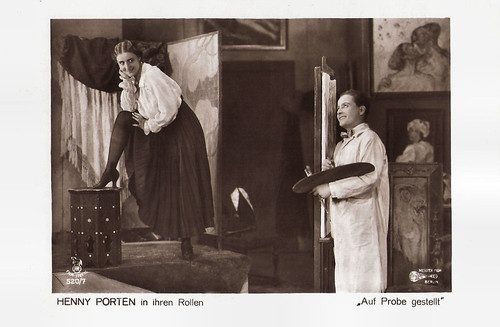
German postcard in the Film Sterne series by Rotophot, no. 520/7. Photo: Messter Film, Berlin. Publicity still for Auf Probe gestellt/Put to the test (Rudolf Biebrach, 1918) with Henny Porten and Hermann Thimig.
In Auf Probe gestellt/Put to the test (Rudolf Biebrach, 1918), Henny Porten portrays the the young and impoverished widower Countess Marlene von Steinitz.
At the instance of her brother-in-law, Count Steinitz (Heinrich Schroth), she plans to marry the stupid but extremely rich Count Adolar von Warowingen (Reinhold Schünzel), which would liberate her from all her problems at once.
She asks Count Steinitz a delay of eight days and travels to the city to find a solution and enjoy her free life one last time. At an artists party she meets painter Frank Merwin (Hermann Thimig), seduces him and manages to invite the handsome young man to her castle.
When he awakes from his dream, he is treated like a famous personality by all bystanders. Marlene pretends to be his bride, putting him to the test to see if he is any good as husband.
Though Merwin stands the test poorly, and he is sent back to his shabby room, the Countess decides to have him, leaving Count Adolar with a basket as gift, and betrothing Frank in the city.
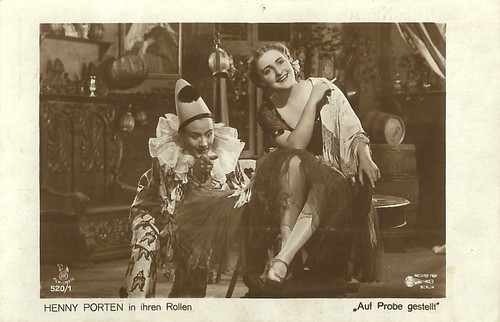
German postcard in the Film Sterne series by Rotophot, no. 520/1. Photo: Messter Film, Berlin. Publicity still for Auf Probe gestellt/Put to the test (Rudolf Biebrach, 1918) with Henny Porten.
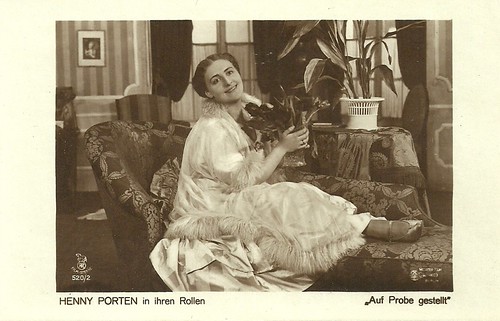
German postcard in the Film Sterne series by Rotophot, no. 520/2. Photo: Messter Film, Berlin. Publicity still for Auf Probe gestellt/Put to the test (Rudolf Biebrach, 1918) with Henny Porten.
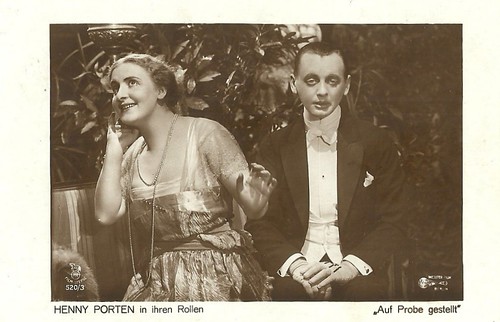
German postcard in the Film Sterne series by Rotophot, no. 520/3. Photo: Messter Film, Berlin. Publicity still for Auf Probe gestellt/Put to the test (Rudolf Biebrach, 1918) with Henny Porten and Reinhold Schünzel.
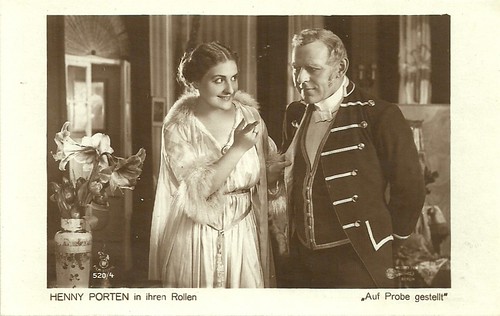
German postcard in the Film Sterne series by Rotophot, no. 520/4. Photo: Messter Film, Berlin. Publicity still for Auf Probe gestellt/Put to the test (Rudolf Biebrach, 1918) with Henny Porten.
The script of Auf Probe gestellt/Put to the test was written by Robert Wiene, the future director of the classic silent horror film Das Cabinet des Dr. Caligari/The Cabinet of Dr. Caligari (1920)
Ludwig Kainer had designed the sets for the film. Kainer designed the sets of all the late 1910s films with Porten and director Rudolf Biebrach.
The camera work was done by famous cinematographer and future director Karl Freund. He had shot many of the late 1910s films with Porten and directed by Biebrach. The following year, in 1919, Freund would become the close collaborator of director Friedrich Wilhelm Murnau.
Auf Probe gestellt premiered on 15 March 1918 at the Mozartsaal cinema in the heart of Berlin.
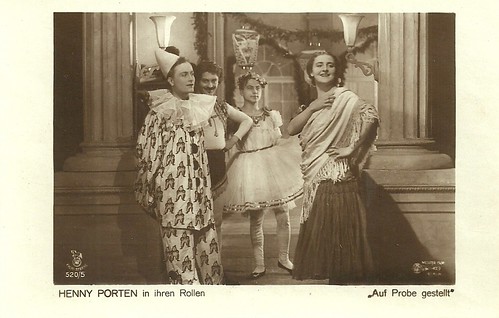
German postcard in the Film Sterne series by Rotophot, no. 520/5. Photo: Messter Film, Berlin. Publicity still for Auf Probe gestellt/Put to the test (Rudolf Biebrach, 1918) with Henny Porten.
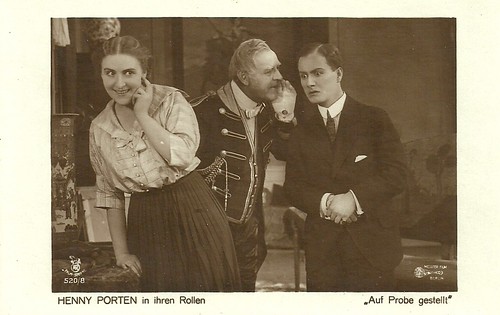
German postcard in the Film Sterne series by Rotophot, no. 520/8. Photo: Messter Film, Berlin. Publicity still for Auf Probe gestellt/Put to the test (Rudolf Biebrach, 1918) with Henny Porten and Hermann Thimig.
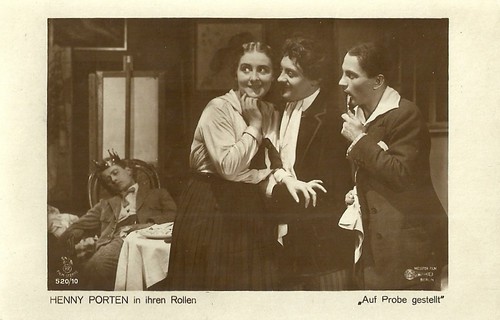
German postcard in the Film Sterne series by Rotophot, no. 520/10. Photo: Messter Film, Berlin. Publicity still for Auf Probe gestellt/Put to the test (Rudolf Biebrach, 1918).
Sources: Wikipedia (German) and IMDb.

German postcard in the Film Sterne series by Rotophot, no. 520/7. Photo: Messter Film, Berlin. Publicity still for Auf Probe gestellt/Put to the test (Rudolf Biebrach, 1918) with Henny Porten and Hermann Thimig.
Put to the marriage test
In Auf Probe gestellt/Put to the test (Rudolf Biebrach, 1918), Henny Porten portrays the the young and impoverished widower Countess Marlene von Steinitz.
At the instance of her brother-in-law, Count Steinitz (Heinrich Schroth), she plans to marry the stupid but extremely rich Count Adolar von Warowingen (Reinhold Schünzel), which would liberate her from all her problems at once.
She asks Count Steinitz a delay of eight days and travels to the city to find a solution and enjoy her free life one last time. At an artists party she meets painter Frank Merwin (Hermann Thimig), seduces him and manages to invite the handsome young man to her castle.
When he awakes from his dream, he is treated like a famous personality by all bystanders. Marlene pretends to be his bride, putting him to the test to see if he is any good as husband.
Though Merwin stands the test poorly, and he is sent back to his shabby room, the Countess decides to have him, leaving Count Adolar with a basket as gift, and betrothing Frank in the city.

German postcard in the Film Sterne series by Rotophot, no. 520/1. Photo: Messter Film, Berlin. Publicity still for Auf Probe gestellt/Put to the test (Rudolf Biebrach, 1918) with Henny Porten.

German postcard in the Film Sterne series by Rotophot, no. 520/2. Photo: Messter Film, Berlin. Publicity still for Auf Probe gestellt/Put to the test (Rudolf Biebrach, 1918) with Henny Porten.

German postcard in the Film Sterne series by Rotophot, no. 520/3. Photo: Messter Film, Berlin. Publicity still for Auf Probe gestellt/Put to the test (Rudolf Biebrach, 1918) with Henny Porten and Reinhold Schünzel.

German postcard in the Film Sterne series by Rotophot, no. 520/4. Photo: Messter Film, Berlin. Publicity still for Auf Probe gestellt/Put to the test (Rudolf Biebrach, 1918) with Henny Porten.
The talent behind Auf Probe gestellt
The script of Auf Probe gestellt/Put to the test was written by Robert Wiene, the future director of the classic silent horror film Das Cabinet des Dr. Caligari/The Cabinet of Dr. Caligari (1920)
Ludwig Kainer had designed the sets for the film. Kainer designed the sets of all the late 1910s films with Porten and director Rudolf Biebrach.
The camera work was done by famous cinematographer and future director Karl Freund. He had shot many of the late 1910s films with Porten and directed by Biebrach. The following year, in 1919, Freund would become the close collaborator of director Friedrich Wilhelm Murnau.
Auf Probe gestellt premiered on 15 March 1918 at the Mozartsaal cinema in the heart of Berlin.

German postcard in the Film Sterne series by Rotophot, no. 520/5. Photo: Messter Film, Berlin. Publicity still for Auf Probe gestellt/Put to the test (Rudolf Biebrach, 1918) with Henny Porten.

German postcard in the Film Sterne series by Rotophot, no. 520/8. Photo: Messter Film, Berlin. Publicity still for Auf Probe gestellt/Put to the test (Rudolf Biebrach, 1918) with Henny Porten and Hermann Thimig.

German postcard in the Film Sterne series by Rotophot, no. 520/10. Photo: Messter Film, Berlin. Publicity still for Auf Probe gestellt/Put to the test (Rudolf Biebrach, 1918).
Sources: Wikipedia (German) and IMDb.
No comments:
Post a Comment